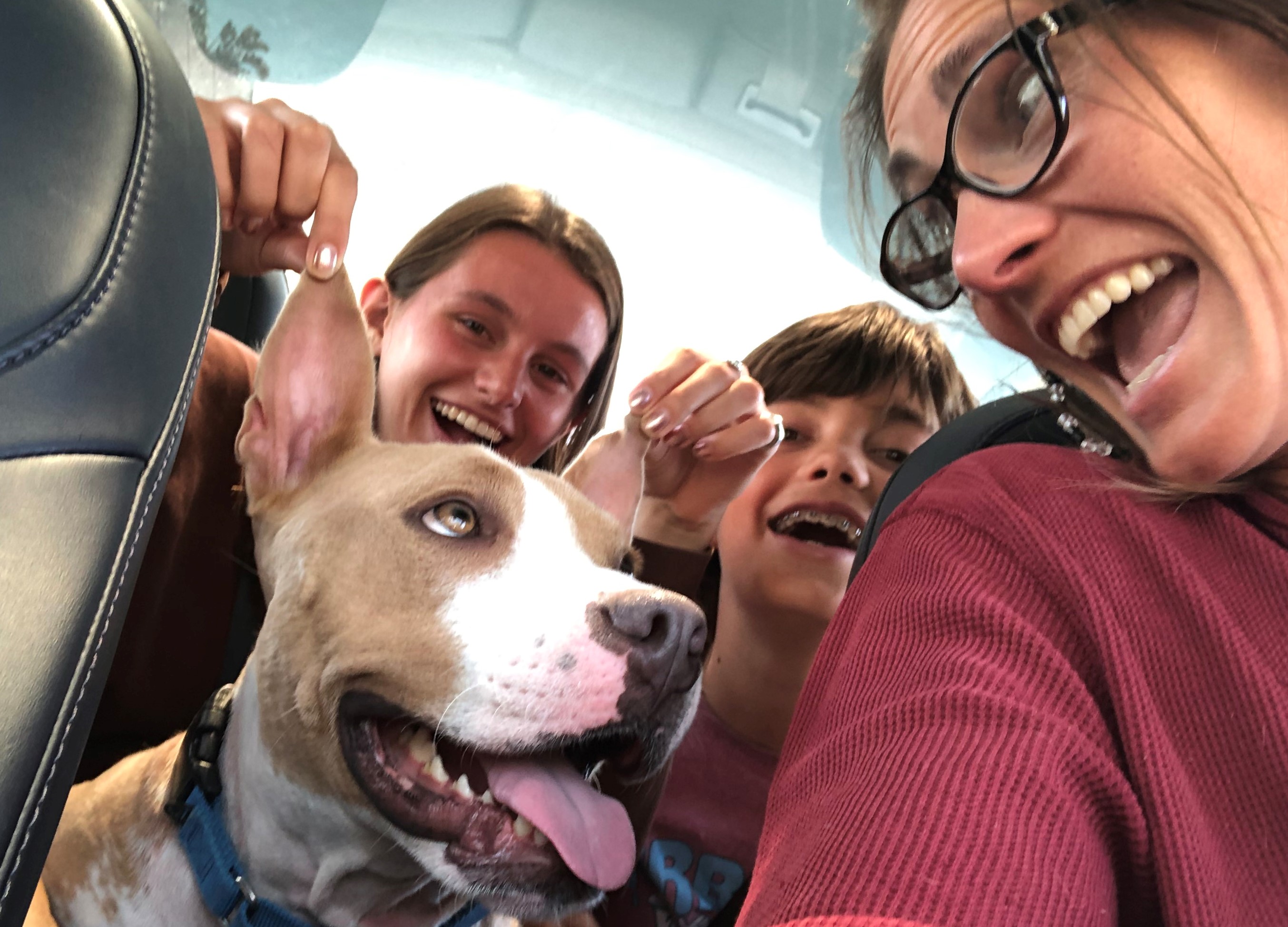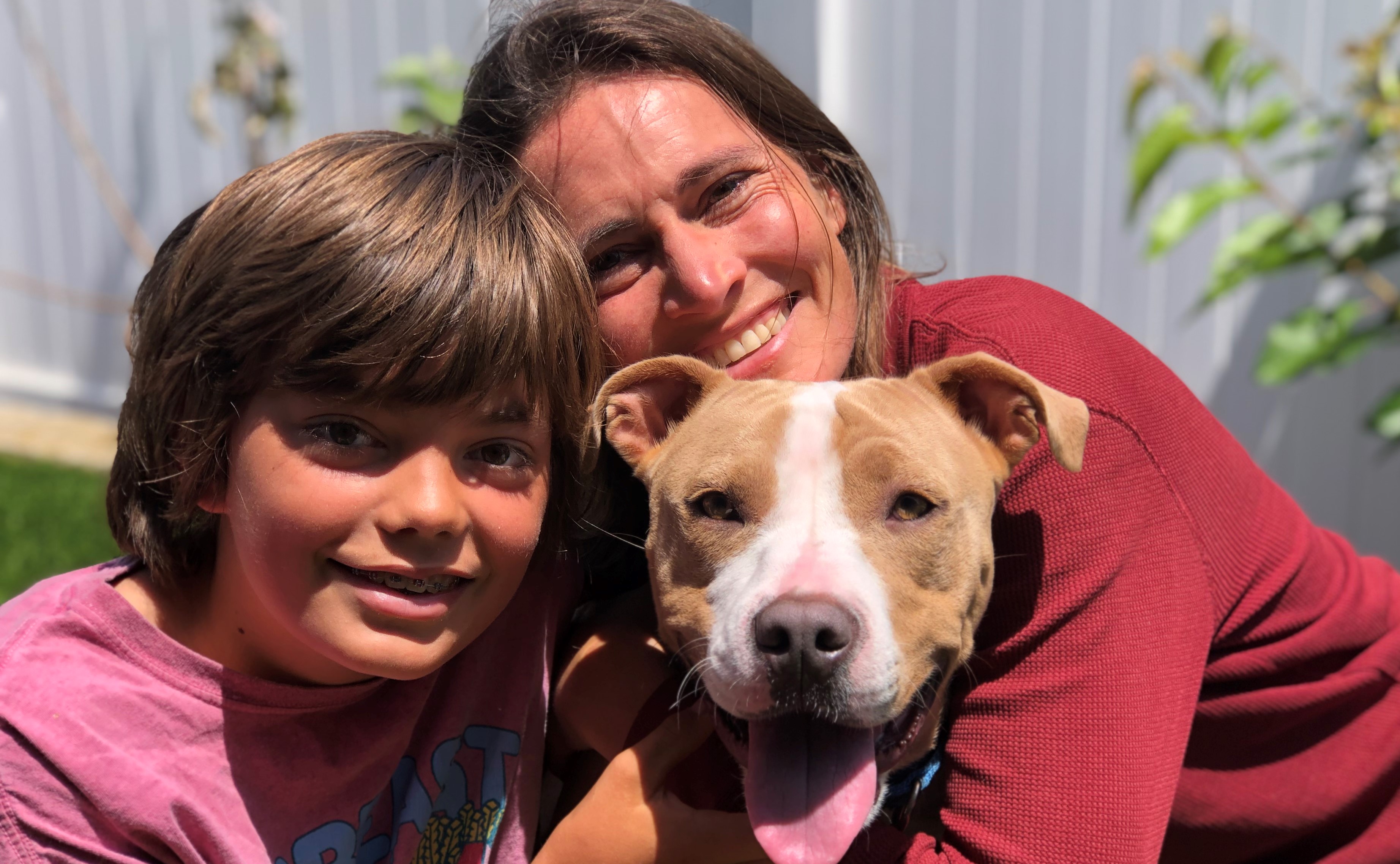
Zod peeks out from the bedsheets. He's one of 10 puppies (plus their mom) that Maureen K. Day's family fostered. (Courtesy of Maureen K. Day)
My kids have wanted a dog for a long time. I've been less certain. Then I thought of a way we could test-run dog ownership: fostering a dog through our local shelter. Apparently we decided to "go big or go home" because in about a week I went to the shelter to pick up a range of supplies and 11 dogs. The mama, a fawny pit bull, was Little Girl and her pups were 10 days old. While the first few hours were nothing short of magical, soon "real life" set in.
Surrender
The way my body tells me that I've crossed a critical stress level is lower back pain. Around Day Three of this puppy and not-quite-housebroken mama experience, the back pain started. Day Five arrived and all I could think about was how filthy the kids' bathroom — where the puppies stayed — was, how walking in and out of that room was tracking an invisible film of contamination everywhere, and that there was really nothing I could do but live with this for six more weeks. I knew, at some point in the future, I'd be spending a full Saturday shampooing carpets and bleaching tile.
Explaining my stress to my husband, he replied, "But that's Future Maureen's problem."
"What?" He was speaking nonsense to my survival-mode brain.
"There's nothing you can do about this now. You know this. So why think about it? Just do what Now Maureen can do and know that the problem will be over one day, but not today. You'll handle it when you can."
It made perfect sense. Be present and do what you can and don't sweat the things that are out of your hands. Within an hour, the back pain was gone.

3305 Maureen K. Day and her children, Veronica and David, enjoy their last day with Little Girl. (Courtesy of Maureen K. Day)
Happiness
This is perhaps the trickiest insight from this experience. And that's because we have a variety of understandings of happiness. One of them is pretty common, and I'm not a big fan of it.
In this first understanding, happiness means having an easy life, one characterized by pleasure and an avoidance of pain. Aristotle (and St. Thomas Aquinas) had a different understanding. Happiness is the flourishing of a person; it is the sign of a life well-lived. It is about having meaning, purpose, community and love. And anyone who has ever loved knows that to love is to suffer. Sure, you have a great connection with someone in a way that brings your personhood to life, but when those you love suffer, you absolutely suffer alongside them. And you'll also forego things that would make your life easier (e.g., a full night's sleep) if it ensures the well-being of a loved one (e.g., a full belly for your newborn). Happiness does not mean an end to suffering, but by necessity includes it. And this sort of happiness grants a real sense of a life well-lived, the fruits of which are generosity, joy, hope, gratitude and more.
Advertisement
The puppies were amazing. I cannot even describe the dopamine rush I got when 10 puppies would charge me like I was the awesomest person in the world. But they were demanding. In fact, my daughter asked if newborns were this hard; the 10 puppies were harder. The poop cleanup took about two hours every day, and the kids stuck by their word and did this without complaint.
Lasting happiness unmistakably draws us in and helps us see how precious we are and how fleeting life is. And when we are brought into the life of another in a way that renders both persons beautifully vulnerable, our joys are shared, but so are the sorrows. And sometimes, most awfully, the hurt is from our own doing. Forgiveness, courage, dedication, fidelity, hope, compassion — we don't learn this with that first understanding of happiness; we need to go "all in" on this beatific version.
Discernment
This was the hardest insight for me, as I realized only when it was too late that I discerned poorly. About three days after the puppies were weaned, we got an email that someone wanted to meet Little Girl on Sunday, hoping to adopt her. I wasn't expecting interest to happen so quickly as there are other dogs who have been there for over a year. Something left me unsettled, but I ignored it.
Although the kids kept saying that Little Girl was a good dog and that she really belonged with us, I had a long list of why we shouldn't adopt her: Her velcro-y attachment to me left me feeling a bit smothered, I like to be able to travel anywhere and anytime, she wasn't fully housebroken (and nothing seemed to be working), and David — the youngest — would be off to college in five years and I'd be responsible for the dog. The shouldn'ts were several. And as long as there was a shouldn't, I wasn't looking at the shoulds.
The shoulds were fewer, but compelling: she fit right in and it just felt right to adopt her. But with those shouldn'ts looming, it felt foolish to listen to the shoulds.
There are a lot of big decisions that require a careful discernment of the shoulds and shouldn'ts: whom to marry, when to have that first child, a long-distance move, a career change. Owning a pet is admittedly not as defining as some of these, but it should bear real discernment, nonetheless.

Maureen K. Day and her children, Veronica and David, enjoy their last day with Little Girl. (Courtesy of Maureen K. Day)
I went to Mass in the morning before we were to bring Little Girl to meet her potential owner. The Gospel reading was the one where Peter sees Jesus from the boat and does the "foolish" thing: He jumps from the boat and swims the hundred yards to Jesus. The Gospel doesn't say whether Peter got to Jesus before or after the boat, but there was something about his foolish choice that always lightened my heart and inspired me to take plunges of my own more often, even when they didn't make sense.
But this time I didn't. And the young woman took Little Girl home. And me and the kids cried quite a bit for the next few days. Regret is the consequence of a choice poorly discerned, but regret is generous in still providing wisdom for the future.
Discernment isn't about eliminating all the shouldn'ts before you act. It's about listening well to the shoulds and the shouldn'ts and then choosing one wholeheartedly. It's about contemplating the whole picture, taking careful note of the ways challenges might still present in the future, but leaning in faith into either the shoulds or the shouldn'ts and trusting yourself, your community and the process.
How did things end up for us? The puppies all found homes within three days of going to the shelter. Now we have Zod, whom we picked because he was experiencing very serious shelter stress. He is a sweet 7-year-old pit/Labrador mix who loves kids, but not other dogs (which makes us unable to adopt him as my sister visits often with her dog). In addition to the dog issue, he also has epilepsy, and often a chronic condition adds to the challenge in finding his forever family. For now he has meals, walks, belly rubs, adults who work from home and kids to sleep with at night.
The Catholic insights will no doubt continue as we encounter the various animals (and humans) who will find rest with our family.



